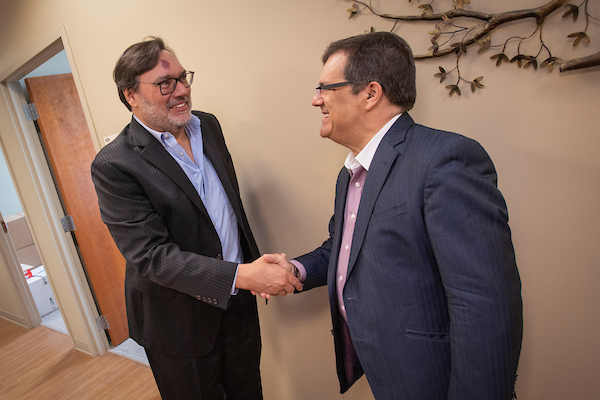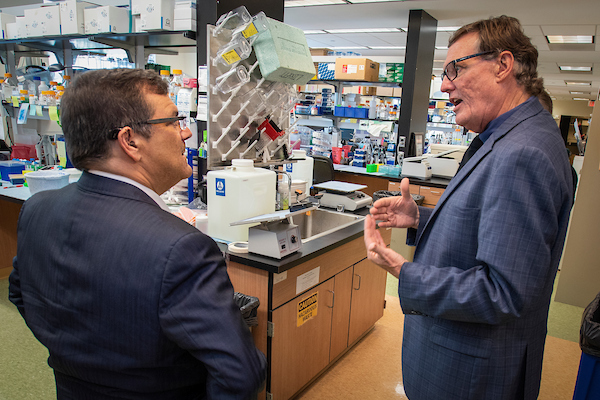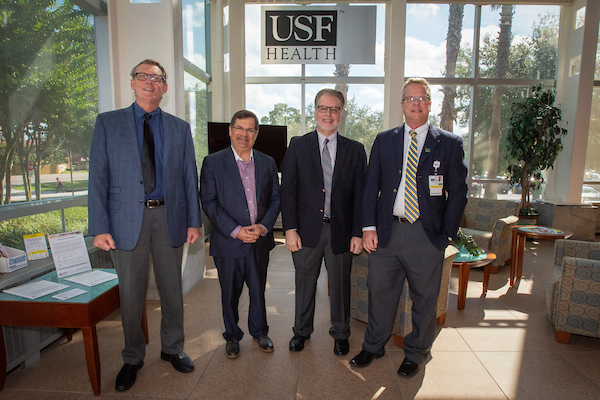
USF Health Neuroscience Institute leaders accompany U.S. Rep. Gus Bilirakis on a tour of research laboratories in the Byrd Alzheimer’s Center, a centerpiece of the Institute.
Neurological diseases are growing at an unprecedented rate as Americans live longer and survive other chronic conditions like cardiovascular disease and cancer.
During U.S. Rep. Gus Bilirakis’ visit to the USF Health Neuroscience Institute on Aug. 24, the congressman was given an overview of the multidisciplinary research and clinical care that the University of South Florida conducts to help combat the human and economic burden of neurological diseases, including dementia, stroke, Parkinson’s disease and brain trauma.
The USF Health Neuroscience Institute, home of the Johnnie B. Byrd, Sr., Alzheimer’s Center, integrates three clinical departments — Neurology, Neurosurgery and Psychiatry – along with related basic and translational science departments. The Institute’s focus on consolidating disease-specific care for a wide spectrum of neurological diseases is intended to strengthen collaborative neuroscience research across USF and help accelerate promising discoveries from bench to bedside.

Laura Blair, PhD, assistant professor of molecular medicine, explains her team’s research on chaperone proteins that drive different states of the tau protein associated with Alzheimer’s and other neurodegenerative diseases. The USF Health researchers are identifying promising targets to help slow or prevent disease progression.
Bilirakis toured laboratories and the Johnnie B. Byrd, Sr., Alzheimer’s Center, the centerpiece of the Neuroscience Institute, with Stephen Liggett, MD, associate vice president for research at USF Health; Clifton Gooch, MD, chair of neurology at the USF Health Morsani College of Medicine (MCOM); and Glenn Currier, MD, chair of psychiatry and behavioral neurosciences at MCOM. He also met with Robert Hauser, MD, director of the USF Parkinson’s Disease and Movement Disorders Center, which is designated a National Parkinson’s Foundation Center of Excellence.
These USF Health leaders spoke about the need for more federal resources directed toward helping advance early diagnosis and new treatments to delay, minimize and prevent nervous system disorders.

Robert Hauser, MD, (left) director of the nationally recognized USF Parkinson’s Disease and Movement Center, welcomes Bilirakis.
Among a few informational items they shared with the congressman:
- National Institute of Health grant funding does not cover the expense of high-tech equipment increasingly needed to do things like study single cells in the brain to understand the root cause of neurological diseases.
- 100 million Americans are afflicted with at least one neurological disease. A USF study led by Dr. Gooch and published last year in the Annals of Neurology found that the cost of diagnosed neurological disorders approaches a staggering $800 billion a year.
- More than half of MCOM’s $14.7 million in clinical trial revenue for FY 2018 was neuroscience related (neurology, psychiatry and neurosurgery).
- In addition to the Byrd Alzheimer’s Center and Parkinson’s Disease and Movement Disorders Center, other centers of excellence under the auspices of the USF Health Neuroscience Institute include stroke, epilepsy, multiple sclerosis (MS), Huntington’s disease, amyotrophic lateral sclerosis (ALS), ataxias with an emphasis on Friedreich’s ataxia, and aging and brain repair.
- USF Health Psychiatry and Behavioral Sciences continues to strengthen neurobiology research to discover new treatments for Alzheimer’s disease and abnormal brain development, as well as related mental disorders including autism. Current NIH-funded projects include studying ways to effectively deliver central nervous system drugs across the blood-brain barrier and testing the effectiveness of computer brain training games in protecting against cognitive decline.

USF Health’s Stephen Liggett, MD, (right) chats with Bilirakis in one of the laboratories at the Neuroscience Institute.

From left: Stephen Liggett, MD, USF Health associate vice president for research and Morsani College of Medicine vice dean for research; Congressman Gus Bilirakis, who represents Florida’s 12th District; Clifton Gooch, MD, chair of neurology; and Glenn Currier, MD, chair of psychiatry and behavioral neurosciences.
-Photos by Eric Younghans, USF Health Communications and Marketing
